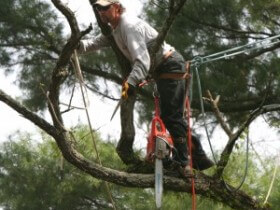Some people believe that growing a garden is difficult, but with the proper information, you can have a great garden of your own. The right information can help anyone become a master gardener. The tips from this article can show you everything you need to know about becoming a master gardener.
Shelter your deciduous shrubs. Any potted shrubs should be sheltered in the winter from cold weather. Tie together the tops, and then use a sheet or blanket to cover the wigwam loosely. This tactic is better than utilizing plastic, because it will allow air to circulate.
Plants need to take in CO2 to grow and thrive. The majority of plants grow much better when CO2 levels are at their highest. The best way to get a lot of it is through a greenhouse. When it is exposed to high carbon dioxide levels, a plant has the best growing condition possible.
Research the amount of water, food and sunlight your plants require for optimal health and growth. Over watering can cause the roots of your plants to rot and under watering does not give your plants the moisture they need to grow healthy and strong. Check the moisture level of your soil to determine if it is getting adequate water.
Plan your vegetable garden on paper! List what you want grown and create a detailed drawing off the area and where everything will be planted. You should consider each plant’s mature size, water requirements and need for sunlight.
Plant trees with beautifying fall fruit. Fall color is usually associated with foliage, but there are various trees that have beautiful fruit. The berries range in shade from yellow to deep red, and can last well into the winter, providing a little color in the garden and food for the birds. Some berries to consider are crabapples, holly and chokeberry.
Use perennials resistant to slugs and snails. Snails and slugs can do irreparable damage to your garden in a single night. Snails and slugs like to eat perennials with smooth and thin leaves, especially if they are young plants. Perennials with hairy leaves or bitter taste are unattractive to snails and slugs, keeping them safe from harm. Consider planting these varieties of perennials to discourage slugs and snails from eating your flowers. Euphorbia and achillea are examples of slug-proof perennials.
Aim to increase your property’s value. You can get a very high return from improving your home through landscaping. Certain plant investments could raise your home’s resale value by approximately 20% or possibly more! Be sure to choose plants that will thrive in your yard, taking into account soil and climate conditions.
Plants that climb can hide fences and walls. Climbing plants are great for hiding hideous fences and walls, and they usually grow within a season. They also have been known to grow through existing trees or shrubs, or can be easily taught to cover any size arbor. There are those that have to be fixed to a support, but others will find a surface to cling to all on their own through twining stems or tendrils. Reliable varieties include clematis, honeysuckle, wisteria, jasmine and climbing roses.
Aerate and dry your plants each day. Moisture on plants is sure to attract disease and parasites. Fungi is a common problem in the world of plants. Proactively treat fungi through the use of fungicidal sprays and treatments.
Gardening can be a fun and easy hobby once you have laid some of the groundwork in place. With solid information, like the information you learned here, you will be able to plant a master garden that will be the envy of everyone you know.
Blue widgets can be a complicated topic. With the correct information and advice you are much more likely to be successful, but it is extremely important to keep up to date on the topic. Learn from the tips and techniques discussed in this article.




